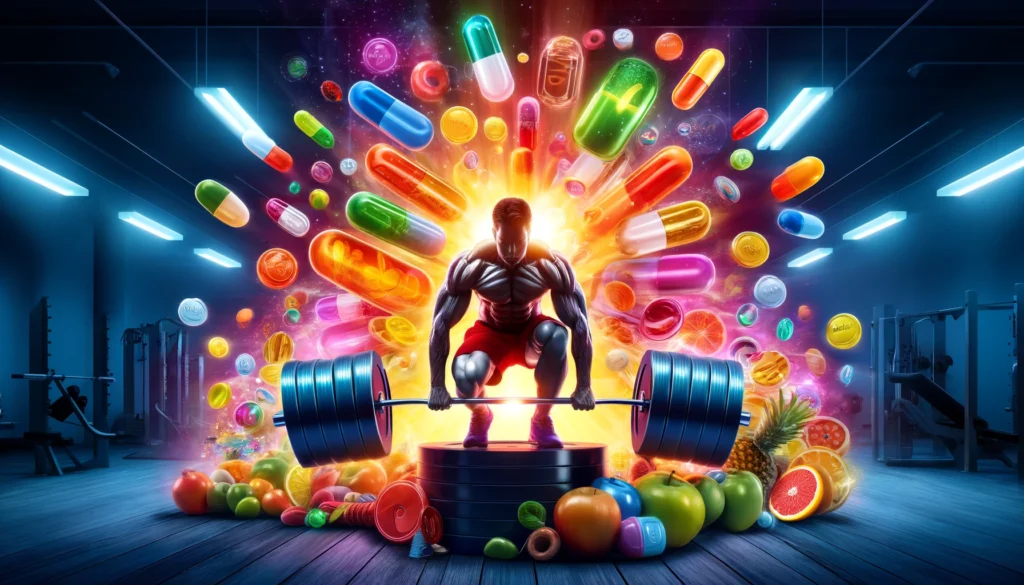
Why These Essential Nutrients Will Polish Your Performance Away!
Achieving peak physical performance, especially in bodybuilding, does not end with lifting heavyweights and consuming high-protein diets.
The major macro-nutrients including proteins, carbohydrates, and fats mostly steal the limelight in nutritional aspects; however, the importance of vitamins cannot be overestimated. These micro-nutrients carry essential functions in the body positively influencing hormones, energy production, muscle hypertrophy, and recovery, just to mention few.
This blog discusses essential vitamins for bodybuilding, nutrient functions, as well as how to incorporate them to optimize your journey in bodybuilding.
Why Do Vitamins Matter for Bodybuilders? They are organic compounds that facilitate various biochemical processes in the body. Vitamins aid in metabolic functions, tissue repair, and boosting the body’s immune system. Taking the right vitamins could result in a good workout or an excellent one and be the difference between adequate recovery and optimal recovery.
Some of the reasons why they are essential to bodybuilders include:
- Energy production concurrently enhances metabolism to carry out thermogenesis
- Muscle repair and growth.
- Vitamin D and C are essential examples Immune support.
- Vitamins A, C, and E is paramount to enhance resilience against infections and diseases
- Reducing inflammation, which forestalls muscle soreness translating to improved recovery from the exercises.
Vitamins Essential for Bodybuilders
- Vitamin D
Vitamin D, also known as the sunshine vitamin, is essential for bone health and proper functioning of muscles. Vitamin D aids in the absorption of calcium, which is critical for maintaining firm bones. Vitamin D is also important for bodybuilders because it influences muscle strength and performance. Muscle weakness and susceptibility to injury may result from a deficiency in this vitamin* 412*. Sources: Sun exposure, fatty fish like salmon and mackerel, fortified dairy, and supplements. Recommendation: 600 to 800 IU daily; however, if you are unable to obtain sufficient sun exposure, you should take more than 800 IU.
- Vitamin C
It is a powerful antioxidant that safeguards the body’s cells from damage by free radicals. Vitamin C is crucial for the synthesis of collagen, which keeps tendons and ligaments strong and on form, and suppresses muscle soreness and acceleration of recovery* 411*. Sources: Citrus fruits, strawberries, bell pepper, broccoli, and Brussels sprouts. Recommendation: 75-90 mg, and more if you are engaged in strenuous exercise.
- B-Complex Vitamins
The B complex consists of several vitamins, including B1 Thiamin, B2 riboflavin, B3 Niacin, B6 Pyridoxine, B7 Biotin, B9 Folate, and B12 Cobalamin. Vitamin Bs, critical for energy metabolism, help absorb carbohydrates, fats, and proteins remove carbon dioxide and body heat during chemical reactivity to produce adenosine triphosphate, which is cellular energy, and is Sold in unit quantities. Sources: whole grains, lean meats, eggs, dairy, green vegetables, and legumes. Recommendation: The daily intake standard varies depending on the B vitamin; thus, adherence to the suggested daily allowance 411.
- Vitamin E
A great antioxidant, vitamin E, protects your body against oxidative stress. As a crucial nutrient for the immune system, it is also vital for muscle growth and recovery. For bodybuilding purposes, vitamin E prevents muscle damage after intense physical activity.
Top food sources: nuts, seeds, spinach, vegetable oils sunflower, safflower
Recommended daily intake : 15mg
- Vitamin A
Vitamin A promotes good vision, healthy skin, and immune functions. Naturally, you need some protein synthesis, which enables muscle growth. Essentially, sufficient vitamin A levels are necessary for overall health maintenance, which you need when aiming for consistent high-performance abilities.
Top sources: carrots, sweet potatoes, spinach, liver
Daily recommendation: 900 mcg for men.
How You Can Get Vitamins in Your Bodybuilding Diet
Regular diet Plan
The best approach to ensuring you maintain essential vitamins levels is to consume a balanced diet with an abundance of fruits and vegetables, proteins, and whole grains. Each group has a variety of vitamins and minerals that your body requires in specific quantities. These recommendations ensure you reap the benefits of each nutrient group.
Supplements
Although eating whole foods is a superior source of vitamins, supplements can be a viable alternative. If you have some deficiencies or additional needs, especially when you train intensely, only the best products are ideal. As such, before you take any nutritional supplement, it is prudent to consult your doctor first.
Ensure Consistent Meal planning
Your meals should contain the essential food groups in their right quantities. This means that a serving of vegetables should always accompany your meals, and fruits and nuts are great snacks.
Finally, drink enough water.
While vitamins are vital, you can consume too much of a good thing, especially in fat-soluble vitamins such as A, D, E, and K, which may become stored in your body and accumulate to toxic levels. Vitamin toxicity symptoms can range from mild, such as nausea and headaches, to severe health impacts. Stick to the advised dose, and avoid mega doses unless your provider recommends otherwise.
Conclusion
Select the Proper Vitamins for Your Bodybuilding Regimen Including the appropriate vitamins in your bodybuilding routine will improve your results, strengthen your muscles, and aid you in healing.
A “get ripped” diet plan reduces your intake of various foods that provide the requested vitamins you’ll need to reach your improved muscular development and faster healing requirements.
You will adjust your nutrition consumption through a well-balanced diet that provides healthy vitamins focused specified supplementation anytime you need it.
Do not forget that merely consuming vitamins will not get you to your objectives, but when combined with a balanced diet, sufficient hydration, and training, and consistency, you can boost your benefits achievements by focusing entirely on your body’s nutrient consumption.
